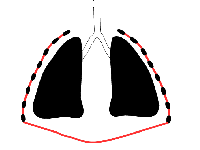 |
These waste products contain water, oxygen and carbon dioxide.
WHAT IS BREATHING? Breathing is the first part of the respiratory system and is something you do all the time without thinking about it.
WHY DO YOU BREATHE? You breathe so your body can take in the oxygen it needs and can get rid of waste products such as carbon dioxide and water. |
|
WHAT HAPPENS WHEN YOU BREATHE? When you breathe in, you suck in air containing oxygen. This oxygenated air passes through your nose and throat.
WHAT HAPPENS TO THE AIR THEN? Dirt and bacteria is carried in the air and the hairs in your nose filter each of these out. The air is also warmed and moistened. |
|
|
WHERE DOES THE AIR GO TO NEXT? This moistened warm air then passes down your windpipe or trachea, into two tubes called the bronchi. The bronchi divide into small branches that end in a mass of air sacs in your lungs. These air sacs are lined with tiny blood vessels called capillaries. Oxygen seeps through the walls of the lungs and into these capillaries where it is absorbed into the blood system. |
